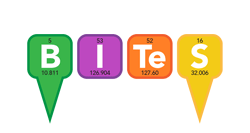Tools of the Trade
Or
Why every inorganic chemist should have a Michaels Reward card

Or
Why every inorganic chemist should have a Michaels Reward card
I know this goes against my earlier BITeS saying we would use BITeS less for just making announcement, but I think in this case I can make an exception. If you have been looking to submit a poster for our Undergraduate Research at the Frontiers of Inorganic Chemistry session in San Diego you may have noticed that there wasn't a poster session listed. You should consider this your invitation to submit a poster or talk. My deepest thanks to Chantal Stieber for pointing out the missing poster session.
There is currently a movie out called "What Men Want". It is essentially a remake of "What Women Want" from 2000. The idea is that one person can hear the innermost thoughts of people of a different gender. If you had the misfortune of hearing my innermost thoughts you would learn that I would like an answer to this question...HOW????
How? What exactly does that mean? It means that I am really struggling with a quote that seems to be getting thrown in my direction an awful lot lately. That quote is one that I am guessing many of you have heard before.
Do you have a favorite In-Class Activity that you could share with the VIPEr community? Our second Community Challenge is to submit a new In-Class Activity learning object with "2019 Community Challenge #2" in the title. We will be collecting all these and awarding a random prize of an Element Card Deck (see description of my activity and link below) to one of those who contribute by February 15. If you need a refresher on how to submit a learning object on VIPEr, check out our step by step guide.
I have been doing a lot of research on the efficacy of Student Evaluations of Teaching (SETs). This is part of a personal mission to try to convince the leadership of my institution to stop using SETs for tenure or salary decisions for faculty members. The short version is that SETs are biased against women and minorities. I have been trying to affect change at my institution by beginning conversations and discussions around this topic. I have learned a lot and wanted to share it with the community.
Part of teaching and research in chemistry is learning about and implementing chemical safety. Safety often becomes reactionary, where some large accident occurs (e.g.
Are you ready for... 2019? ...the International Year of the Periodic Table? ...becoming more involved on VIPEr? ...a year full of IONiC Community Challenges? The New Year is a great time to dive in and give back to the community!
Calling all Friends of VIPEr: have you ever wondered how you can give back to the amazing online inorganic community that has brought you learning objects (just in time for class tomorrow), workshops, and ACS symposia on undergradua
Kyle Grice set us up recently with his post. He described how course-based undergraduate research experiences (CUREs) are gaining momentum in the chemistry community to replace traditional “cook-book” laboratory experiences. A CURE must follow five characteristics: use of scientific practices, discovery, broadly relevant to the larger scientific community, collaboration, and iteration.